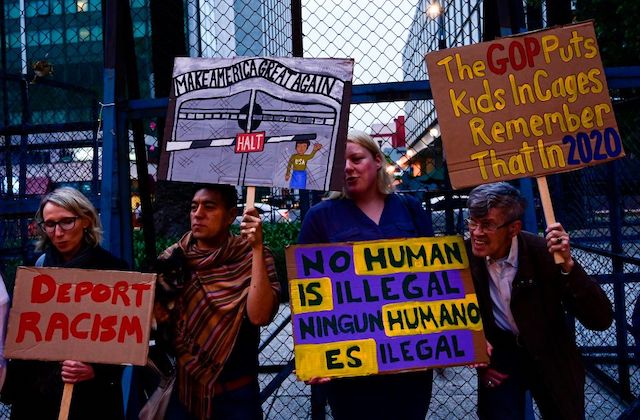Detained immigrants inside multiple New Jersey detention centers have organized a hunger strike to protest their unsanitary living conditions, which could aid in the spread of COVID-19, Vice News reports. A medical staffer at the privately owned Elizabeth Detention Center (EDC) tested positive for the disease last week, which led approximately 40 detainees to refuse meals on March 20.
One Central-American detainee at EDC spoke to Vice under the condition of anonymity for fear of reprisals. “They’re not taking any measures to protect us,” the person said. “They haven’t done any cleaning. We spent three days without soap.”
Reports Vice:
The detainee said that the detention facility has done little or nothing in response to the confirmed COVID-19 case. He and his fellow inmates remain housed in a single large room with bunk beds, and new detainees have continued to be brought in from the outside.
They have not been supplied with hand sanitizer or any personal protective equipment. Guards are not using gloves or masks. He and the other hunger strikers are demanding to be released—or at least that no new detainees be brought into the facility.
The anonymous detainee, who was apprehended crossing the U.S.-Mexico border, told the news outlet that many inside are afraid for their lives. “There’s a lot of fear, because if they bring in an infected person, we’re all going to get infected,” they said. “If anyone gets something here, then we all get it, because we all breathe the same air.”
In addition to EDC, Vice reports a group of detainees at the Hudson County Corrections and Rehabilitation Center (HCC)—a county jail with a contract to house Immigration and Customs Enforcement (ICE) detainees—began a hunger strike on March 18, with others joining them on March 19.
According to Vice:
A detainee who was released from the Hudson facility on Wednesday, who asked to be identified only as Nick, says he was placed in isolation this week and tested for COVID-19 with no explanation. He was then told his test results were negative and returned to the general population. The detainees in his dormitory had been moved from a single, open hall into individual cells, each one housing two people. Nick described the rooms as tiny, filthy, and freezing. Each room has a single toilet with no cover, which the detainees are only allowed to flush twice an hour.
The detainees are still brought into common areas once a day in groups of around 20, but are not told to exercise any precautions, Nick said. They were given one source of hand sanitizer this week, which quickly ran out.
A striking detainee named Olisa Uzoegwu told Vice he stopped eating on March 18 because he doesn’t feel safe. “They say they are locking us in so we can be protected,” he said. “But they don’t do anything different. The cells stink. The toilets don’t flush. There’s never enough soap. They give out soap once a week. One bar of soap a week. How does that make any sense?”
ICE spokesperson Rachael Yong Yow didn’t answer directly when Vice asked if the agency was testing inmates for COVID-19. Instead, she said the agency continues to comply with CDC guidelines.
According to Vice, James Kennelly, a spokesperson for HCC, said that “two detainees had been tested for COVID-19 with negative results, and that new detainees are screened for symptoms of the virus and returned to ICE if symptomatic.” Kennelly added that “inmates are given hand sanitizer upon arrival” and that cells are “cleaned regularly and are heated.”
As Colorlines reported on March 13, advocates and doctors are calling for the immediate release of low-risk inmates in an effort to minimize the spread of the novel virus. “On a normal day, conditions in immigrant detention are extremely dire,” Rebecca Gendelman, a legal fellow with Human Rights First told Vice. “There’s limited access to medical care, the care is often not adequate, and neither are hygiene and cleaning. And all this is before there’s a global pandemic.”
